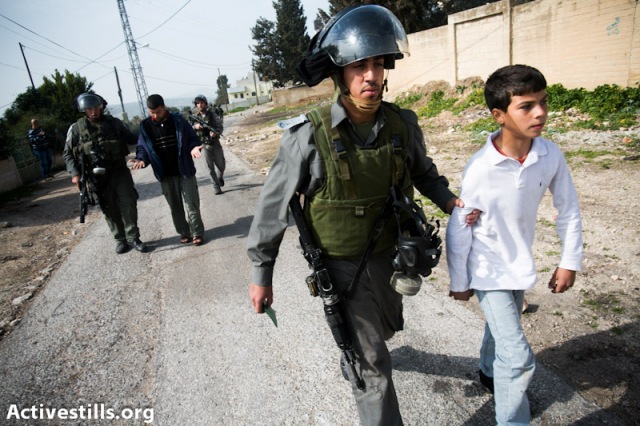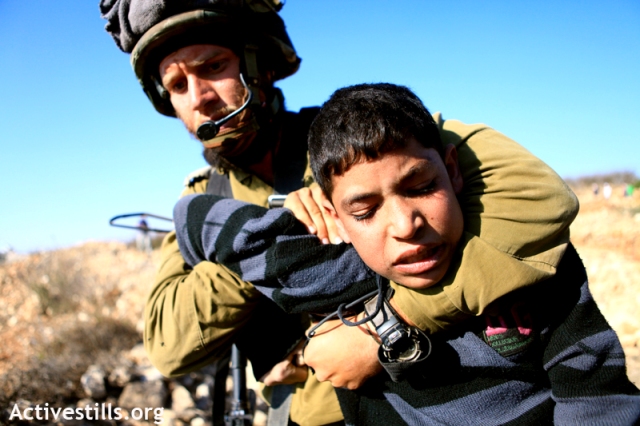A story in ‘The Australian’ newspaper offers a glimpse into the makings of a UN report on Palestinian children detained by Israel, including a look into how Israeli pressure reportedly muffled the report’s criticism.
The issue of Israel’s treatment of detained minors has been gaining more and more attention in recent weeks. Aside from ongoing parliamentary debates in the UK, Israel’s Channel 2 News aired a story on the nighttime arrests of child stone-throwers in the Al-Arub Refugee Camp (Hebrew), and we at +972 published Samar Hazboun’s beautiful and horrific photo essay of children’s testimonies from their detention.
Both of these were preceded by a UNICEF report published last month, which has gained much attention for its criticism of Israel’s policies towards minors in the occupied territories. Israel differentiates between Israeli and Palestinian minors by law, offering them different sets of rights, subjecting the Palestinian youths to a military court system, and often denying them basic rights in interrogations in an attempt to extort confessions. The UNICEF report concluded that “ill-treatment of Palestinian children in the Israeli military detention system appears to be widespread, systematic and institutionalized.” Harsh words indeed.
However, it now appears that even these words have been scrutinized and carefully picked, intentionally leaving out words such as “torture,” reportedly due to Israeli pressure on the UN body. Research published this week by John Lyons, Middle East correspondent for The Australian, alleges that attempts were made by UNICEF to blur the severe implications of its own findings. Lyons describes the press conference in which the report was released, and writes about how the room was surprisingly empty due to the agency’s intentional inviting of few journalists following what one UNICEF official reportedly called intense “pressure to cancel this event.”
Things got even stranger when journalists were told they could only film and quote the first five minutes of the press conference, during which Israel was praised for its cooperation and willingness to act upon the report’s recommendations. Only after cameras and microphones were turned off did the officials start elaborating on their actual findings. One official “said children sometimes were told they would be killed or that they or members of their families would be sexually assaulted if they did not confess, usually to stone-throwing,” writes Lyons, while “another said there was ‘a systemic pattern of abuse and torture.'”
Lyons then goes on and reads the report, finding out that the word “torture” is not used directly throughout the report even though practices described in it amount to as much. “The report even deleted ‘torture’ when it quoted relevant sections of international law and substituted it with ‘duress’,” he writes, and compares Article 15 of the Convention Against Torture as it appears in the original and in the report. When he tried to get anyone in UNICEF to comment on these issues, Lyons says he was bounced back and forth between the Jerusalem branch and the New York head office, in what he describes as a “circle of unaccountability”.
Read also:
Detained: Testimonies from Palestinian children imprisoned by Israel
Resource: UNICEF report on Palestinian children in Israeli military detention
Hope ends here: The children’s court at Ofer Military Prison



